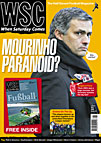 Derby won the title with a low 53 points, as the title fight was between a mish-mash of "town" teams. Roger Titford reports
Derby won the title with a low 53 points, as the title fight was between a mish-mash of "town" teams. Roger Titford reports
The long-term significance
If there was a remake of this season it would be called “What Happens When Big Clubs Go Bad”. For the last time, possibly ever, a variety of “town” teams – Ipswich, Burnley, Derby and Stoke among them – contested the League title deep into the spring. It was an unusual year in many respects: miners did relatively better than stockbrokers in the economic crisis, glamrock was dying and punk not yet born, and England’s big three suffered like never since. It was Liverpool’s only trophyless season between 1973 and 1984. Arsenal spent some time bottom of the table, which they haven’t done since. Manchester United weren’t even in the top flight. Revie, Shankly, Nicholson, Greenwood and Sexton had all followed Sir Alf Ramsey out of long-occupied managerial seats in 1974 and a chance emerged for the lesser lights to shine. It sounds now like an impossible feast of equal opportunity, but at the time they said it was dismal, mundane, violent and “the death of football”.